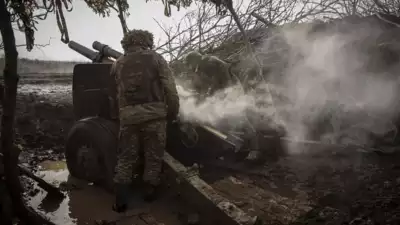WASHINGTON (AP) — Ukrainian drones fly without ammunition. Russian artillery unleash deadly volleys from safe positions beyond the range of Kyiv’s troops. Shortages of ammo and supplies are resulting in lost ground to Moscow, U.S. congressional leaders warn, yet the Republican-controlled House has shown little hurry to resupply Ukraine with military aid.
Across Washington, officials are viewing the drop-off in ammunition shipments with increasing alarm. It’s now been over two months since the U.S. — which since World War II has fashioned itself as the “Arsenal of Democracy” — last sent military supplies to Ukraine.
But House Speaker Mike Johnson appears determined to chart his own course away from a $95 billion foreign aid package passed by the Senate — a decision that could stall the package for weeks to come after an already arduous months-long wait in Congress.
With U.S. military shipments cut off, Ukrainian troops withdrew from the eastern city of Avdiivka last month, where outnumbered defenders had withheld a Russian assault for four months. Delays in military support from the West are complicating the task for Kyiv’s military tacticians, forcing troops to ration ammunition and ultimately costing the lives of Ukrainian soldiers.

“If Ukraine gets the aid they will win. If they don’t get the aid they will lose — with dire consequences to the United States,” said Senate Majority Leader Chuck Schumer, who visited Ukraine last week.
Defense officials are discussing options, which include possibly tapping existing stockpiles even before Congress approves funding to replenish them, according to Sen. Jack Reed, the chair of the Senate Armed Services Committee. And at a White House meeting this week, President Joe Biden, the two top Democrats in Congress and Senate Republican Leader Mitch McConnell all took turns intensely urging Johnson to take up a Senate-passed package that would provide $60 billion worth of assistance for Kyiv.
So far, the Republican speaker has refused.
The Louisiana Republican — just four months into the powerful job as speaker, second in the line to the presidency — is under intense pressure from all sides. The leaders of 23 European parliaments have signed an open letter urging him to pass the aid. And within his own House ranks, senior Republicans are growing restive at the inaction, even as other far-right members have threatened to try to remove him from leadership if he advances the aid for Kyiv.
“The House is actively considering options on a path forward, but our first responsibility is to fund the government and our primary, overriding responsibility — and it has been for the last three years — has been to secure the border,” Johnson said at a news conference.
Johnson responded to the pressure on Ukraine by saying the House had only received the funding legislation in mid-February after the Senate took four months to negotiate, including enforcement policies at the U.S.-Mexico border. The deal on border security swiftly collapsed after Republicans, including Johnson, criticized the proposal as insufficient. Yet Johnson and other House Republicans are once again hoping to secure some policy wins on border security.
When Ukrainian President Volodymyr Zelenskyy visited Congress late last year, he told Johnson that the military aid would last into February. But as Congress entered March, Johnson so far has allowed House members to craft their own proposals and revealed little on his plans for the package.



